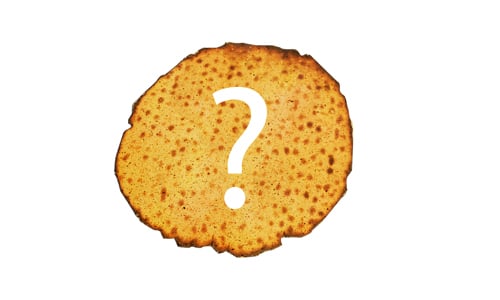There is a widespread custom to eat matzah on the 14th of Iyar, known as Pesach Sheni (the “second Passover”), the day when those who were impure and/or unable to bring the Paschal lamb on Passover were given a second chance to do so.1 Just as the matzah eaten as the afikoman by the Seder commemorates the matzah and Paschal offering eaten in Temple times, so is this matzah a remembrance of the second Passover.
But if this is the case, a question arises: The Paschal lamb (and its accompanying matzah) was consumed on the evening of Iyar 15, but the widespread contemporary custom is to eat matzah on the day of Iyar 14, when the Paschal lamb was slaughtered and prepared. Why?
Now, it should be noted that some do in fact have the custom to eat matzah on the eve of the 15th rather than on the day of the 14th of Iyar. But why are they in the minority?
It’s All in the Prep
Rabbi Zvi Elimelech Shapiro of Dinov, known as the Bnei Yissachar, writes that although he himself ate matzah on the eve of the 15th, the main, public feasts are held on the day of the 14th, as per the custom of the Baal Shem Tov and his students.
On a somewhat mystical note, he explains that in the time period between Passover and the holiday of Shavuot, the emphasis is on the work of preparing and refining ourselves. Thus, we count the Omer, each day taking another step closer to the holiday of Shavuot, when we received the Torah. Appropriately, when it comes to celebrating the second Passover, the main emphasis is on the time of preparation, Iyar 14.2
The Last Remnants of the Miracle
Rabbi Yaakov Emden, known as the Yaavetz (1697-1776), writes that it was “revealed to me from heaven” that Jews were given a second chance to bring the Paschal offering specifically on the 14th of Iyar because that was the last day the Jews still had leftover matzah from when they left Egypt on Passover. After eating the last bit that night (eve of the 15th), the Jews complained to G‑d, “What will we eat?” and it was on the day of the 15th of Iyar that the manna began to fall. Thus, in a certain sense, the 14th marked the culmination of the miracle of the Exodus, while the 15th marked a new phase of the miracles in the desert.3
Although Rabbi Emden is explaining the timing of the second Passover, and not the reason for eating matzah nowadays, some cite this explanation as an additional reason for eating it both on the day of the 14th as well as the eve of the 15th.4
Not to Add to Torah
Rabbi Meir Dan Plotsky (1866–1928), in his work Kli Chemdah, offers a somewhat novel explanation for the widespread custom to eat the matzah on the day of the 14th. He explains that ordinarily there is a concern of not adding to the mitzvahs of the Torah. Now, if one simply does a time-bound mitzvah on a different day of the year without intention of doing the mitzvah (e.g., it’s a hot summer, so one builds a sukkah and eats in it), there is no issue of “adding to the Torah.” However, if it is in theory the proper time for the mitzvah, then there is potentially an issue of adding to the mitzvahs—even if there wasn’t any intention to do so.
Therefore, we specifically eat the matzah on the day of the 14th since the proper time to eat it really would have been the eve of the 15th (if someone were actually observing the second Passover because they were impure on the first Passover), and we wish to avoid making a custom to eat it specifically then. He writes that this is especially true in light of the Jerusalem Talmud’s statement that if the Moshiach will come between the first and second Passover, then all Jews will have the opportunity to bring the Paschal offering on the second Passover.5 Thus, since the second Passover could be an actual holiday for all Jews—when we would all be obligated to eat matzah—we don’t want to have a custom to eat matzah on the 15th, which gives the impression that we are adding to the observance of the day.
Others, however, question this explanation. They note that we eat matzah on all 7 (or 8) days of Passover even though there is no obligation to do so and there is no concern of “adding to a mitzvah.”6
Mystical Numerology
Many have the custom that after counting the Omer, they recite (among other things) psalm 67. This psalm contains 49 words (not counting the introductory verse). According to the Arizal, each word corresponds to a different night of the Omer, and one should have that word in mind when reciting the Omer. The same applies to verse 5 of that psalm, which contains 49 letters,7 each one corresponding to another night. (This can be seen in the standard Kehot Siddur, which includes the word and letter corresponding to each night of the Omer).
Based on this, some point out that the 14th of Iyar, which is the 29th day of the Omer, corrosponds to the word תַּנְחֵם, tancheim (“comfort them”), and the letter yud. The word tancheim has the numerical value of 498: ת-400 נ-50 ח-8 ם-40. Add on the yud, which had the numerical value of 10, and you have 508. This is the same numerical value as Pesach Sheni (פסח שני). Thus, we see a hint in the verse itself that the main celebration of Pesach Sheni is on the 14th of Iyar.8
As noted above, there is good reason to eat matzah on the night of the 15th as well, so although the common practice in Chabad is to eat matzah on the day of the 14th of Iyar,9 the Rebbe also encouraged people to eat matzah on the eve of the 15th.10






Join the Discussion